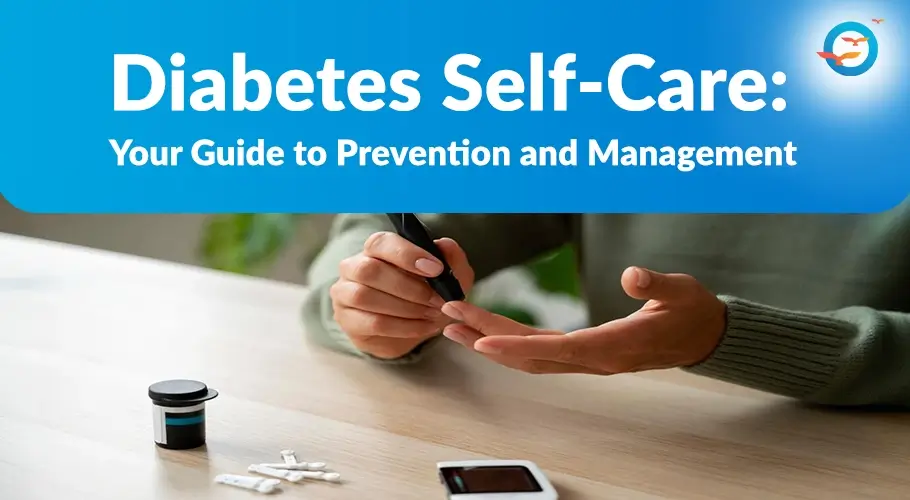Diabetes Prevention and Self-Management Guide

Type 2 Diabetes and Self Care Management
Diabetes is a long-term condition marked by high blood sugar levels, resulting from the body's inability to produce enough insulin or use it effectively. If left unmanaged, it can lead to serious complications such as heart disease, kidney failure, nerve damage, and vision loss.
As the saying goes, "Prevention is better than cure."
This brings us to an important question: Can diabetes be prevented?
The answer is YES! Regular health checkups are key to understanding your risk. Detecting signs of prediabetes early is a warning to take immediate action.
What Are the Best Steps to Prevent Diabetes?
Here are some essential steps for Diabetes prevention and Diabetes self-care management -
1. Work on reasons causing insulin resistance
Insulin resistance occurs when cells in your muscles, fat, and liver don't respond well to insulin, making it harder for glucose to enter cells. Key contributors include a sedentary lifestyle, poor diet, chronic stress, and lack of sleep. Identifying and addressing these factors through lifestyle adjustments can significantly reduce insulin resistance.
2. Keep your weight in check
Excess body weight, especially visceral fat, is a major risk factor for insulin resistance. Maintaining a healthy weight through proper nutrition and regular exercise can improve insulin sensitivity and reduce the risk of metabolic disorders.
3. Keep your waist-to-hip ratio in check
The waist-to-hip ratio is an important marker of abdominal fat and overall health. A high ratio indicates more abdominal fat, which is linked to increased insulin resistance. Regular exercise and a balanced diet can help maintain a healthy ratio, which for most people is below 0.85 for women and 0.90 for men.
4. Avoid milk and milk products for reducing insulin resistance
Dairy products may contribute to insulin spikes due to their insulinotropic effects. Limiting or avoiding milk and high-fat dairy products can help manage insulin levels, especially in individuals prone to insulin resistance.
5. Engage in muscle-building workouts
Strength training and resistance exercises improve insulin sensitivity by increasing muscle mass, which helps utilize glucose more efficiently. Regular muscle-building workouts also improve overall metabolism and support weight management.
6. Regular medical check-ups
Regular health check-ups, including blood sugar, cholesterol, and hormone levels, help in the early detection and management of potential health issues. This proactive approach ensures timely intervention to prevent the progression of insulin resistance and related conditions.
7. A balanced diet with all nutrients (micros and macros)
A well-rounded diet ensures your body gets the essential macro (carbohydrates, proteins, fats) and micronutrients (vitamins, minerals). This balance helps regulate blood sugar levels, support energy production, and improve metabolic health.
8. Correct amount of proteins, fiber, carbohydrates, fats, vitamins, and minerals
Incorporating the right proportions of nutrients is key. High-fiber foods stabilize blood sugar levels, lean proteins support muscle repair, healthy fats improve insulin sensitivity, and adequate vitamins and minerals enhance overall cellular function.
9. Be physically active throughout the day
Consistent physical activity, such as walking, stretching, or light exercises, boosts metabolism and improves insulin sensitivity. Avoid prolonged sitting by incorporating movement into your daily routine.
10. Sleep at the right time for 6 to 8 hours
Quality sleep is essential for hormone regulation, including growth hormones that repair tissues and enhance insulin sensitivity. Aim for consistent sleep patterns, going to bed and waking up at the same time daily, to promote metabolic balance.
11. Manage stress effectively
Chronic stress triggers the release of cortisol, which can lead to insulin resistance and other metabolic disturbances. Adopting stress-management techniques like mindfulness, yoga, or meditation helps maintain hormonal balance and reduces the negative impact of stress on your health.
Adopting these diabetes self-care practices can significantly improve your metabolic health and lower the risk of diabetes and related complications.
Do you want to know more about, What is the Link Between Diabetes and Cardiovascular Disease?
FAQs
What is a diabetes self-management program?
Diabetes Self-Management Program is a structured approach that equips individuals with the skills and knowledge to monitor and manage their blood sugar levels, diet, exercise, and medications effectively.
What is a diabetes prevention and control program?
Diabetes Prevention and Control Program is a public health initiative aimed at reducing diabetes prevalence and complications through education, lifestyle interventions, and community support.
What is diabetes education and self-management?
Diabetes Education and Self-Management is a comprehensive process that empowers individuals to understand their condition and adopt behaviors to maintain blood sugar levels, prevent complications, and improve overall health.

